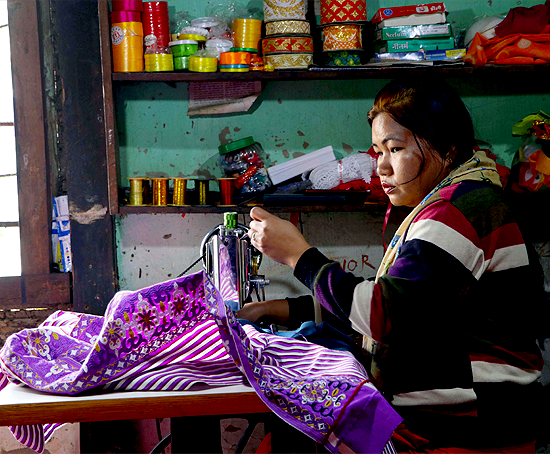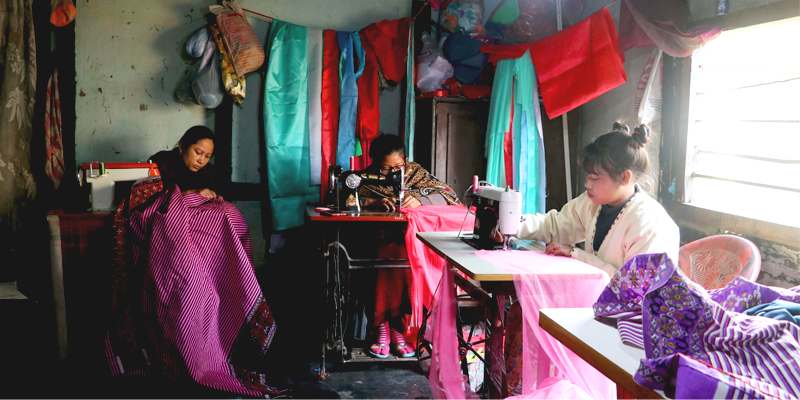
Societal biases and taboos are not uncommon even today, and more women than men face these hurdles in both their personal and professional lives. One such pernicious bias is that faced by unmarried women – a bias that not only affects their acceptance by society at large but also impacts their economic status. ‘Spinsters’, as unmarried women are referred to, often disparagingly, are seen as risks and very few financial institutions will offer them loans to begin their own enterprises.
Leimapokpam Ibemcha Devi, a 38-year-old independent entrepreneur, faced this bias as she struggled to maintain and expand her tailoring business. Ibemcha Devi, who lives with her mother at Wangkhei Ninthem Pukhri Mapal, Imphal East in Manipur, has been offering tailoring services to the community for the past eight or nine years. This includes stitching pullovers, shirts, blouses, mosquito nets and embroidery for traditional dresses. This is her only source of income.

Unfortunately, Ibemcha Devi was hard put to find a consistent and reliable source of power to run her sewing machines. Frequent power cuts, and an unreliable power grid, meant that she could not complete her embroidery work or tailoring projects on schedule. She could not afford to use a generator as her electricity bills were already quite high.
Life threw other googlies at her – a few years ago, Ibemcha Devi had ten sewing machines and seven to eight employees working for her. But all her savings were used to fund her sister’s marriage; moreover, the loss of her sister’s support affected Ibemcha Devi’s productivity, causing the business to lose money. Wanting to re-establish her business, Ibemcha Devi began looking for financial assistance. And this is when she realised that her unmarried status was a definite strike against getting a loan.
Ibemcha Devi was a member of good standing in Chanura Microfin Manipur (CMM), one of the partners of the Tata Trusts’ Energy Initiative in Manipur, being implemented by the Centre for Microfinance and Livelihoods (as associate organisation of the Trusts). For the past five years, she had had a good credit history with them. A CMM field officer informed her about their loans for solar-powered sewing machines. While Ibemcha Devi expressed her eagerness to know more, the field officer enquired about her ability to repay the loan. Though not totally convinced, especially considering the state of Ibemcha Devi’s business at the time, CMM agreed to give her a loan. Members of her Joint Liability Group and a few relatives agreed to stand as guarantors for the loan. Ibemcha recalls, “When my business had deteriorated, the lack of security and my unmarried status meant that people weren’t confident enough to take the risk. I’m grateful to the programme for the help that that was extended to me.”
With the loan amount, Ibemcha Devi purchased a 75 Wp solar-powered sewing machine for Rs40,000. With an 8-hour running capacity, the solar-powered sewing machine has proved a blessing. For one, it has drastically cut her electricity bill. In fact, her EMI of Rs712 per month and her electricity bill of Rs200-300 only add up to half of what she was paying for her utilities, earlier. And it is not just the financial savings; Ibemcha Devi’s work hours have become more flexible, and her income has sky-rocketed to almost double of what she used to earn.
Now, she employs between three to six people depending on necessity, and is able to accept more work. The additional income and savings on utility bills have also enabled Ibemcha Devi to pay back her loan, and purchase new machines. “This loan has not only helped me re-establish my business and expand it, but has also helped people regain their faith in me to provide me with financial aid.”
Ibemcha Devi is planning to construct a proper workshed in her yard so that the business can further flourish. She also has plans to invest in gold with the additional income from her sewing machines. She now lives a life of dignity and self-reliance!
